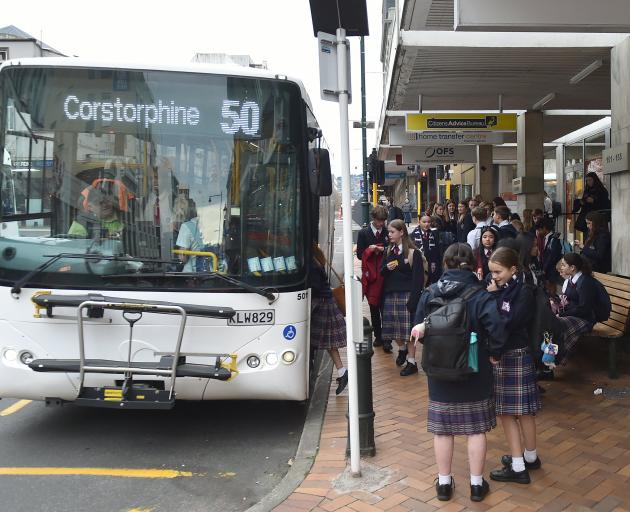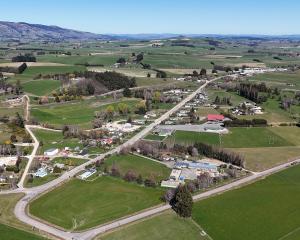
The concerns were raised by Otago Girls’ High School principal Bridget Davidson, who submitted on the Otago Regional Council’s (ORC) Draft Regional Public Transport Plan 2025-2035.
In her submission, Mrs Davidson said Dunedin’s bus hub was an "unsafe and unsuitable environment for young people".
She also singled out the bus stop at 151 Princes St and said the nearby stairs and ramp could be "overcrowded and dangerous after school".
"Because young people are avoiding the bus hub they end up in a crush of people and it is unsafe.
"Greater alternatives for catching buses and more frequent and accessible bus services are needed urgently."
She called for more action to make the bus hub a better environment, saying safety should be an "urgent first consideration".
The Otago Daily Times visited the bus stop in question after school yesterday and spoke to students waiting there.
Maddie Cuthill, 16, believed the bus stop was busy because it was in close proximity to multiple secondary schools.
"I feel bad for the public having to walk down here, especially once your bus comes."
Yahya Albahnasawi, 16, said while he only took the bus once a week, when he did most of the seats were taken.
Others said the bus stop could get so busy you could not walk down the street and passers-by had to ask students to move out of the way.
Trinity Catholic College principal Kate Nicholson said she agreed with Mrs Davidson’s submission.
She had heard anecdotally from students at the school they tried to catch the bus from outside of the bus hub.
However, this could shift the problem of overcrowding to other stops, she said.

"So it's always going to be a problem."
Mrs Nicholson, who is also a member of the central city advisory group — formed after the fatal stabbing of 16-year-old schoolboy Enere Taana-McLaren at the bus hub last year — said the survey work it did last year indicated students were not comfortable going to the bus hub and avoided the area.
She believed this had since improved "a lot" and the presence of the police beat in the area had been very positive, she said.
ORC chairwoman Gretchen Robertson said safety was a shared responsibility and the council was working closely with families, schools, the police and community groups.
"We’re aware of crowding issues at nearby stops like Princes St, which has been identified for an upgrade.
"We also recognise some young people feel unsafe at the hub, which is why our response includes focus on infrastructure, behaviour and partnerships."
The council was looking to continuously improve public transport safety, she said.
A recent campaign promoting kindness was being extended into schools, and the council followed up on all reported incidents.
Security at the bus hub had also been strengthened with a new provider trained in de-escalation, working alongside the police.
Feedback on their presence had so far been positive, but safety went beyond security, Cr Robertson said.
Dunedin Mayor Jules Radich said Mrs Davidson was correct to suggest safety should be an urgent priority in and around the bus hub, "which is why we’ve been so focused on the issue ever since last year’s tragedy".
As chairman of the governance group overseeing the advisory group’s collective efforts, Mr Radich said they were seeing results.
Security in the area had been enhanced, including improved CCTV surveillance, more regular police patrols and uprated security personnel.
"The number of incidents at the bus hub is down.
"We know there’s more to do to improve safety and the culture of behaviour across the central city, and we all, collectively, remain committed to that effort."












